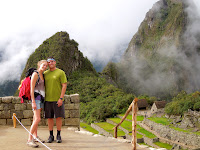Dia Uno:
 |
Yawar explaining Quechua
history along our trek |
Machu Picchu is the main reason the
majority of the tourists come to Cusco in the first place.
So, the fact that it has been almost a month
that we have lived here and not gone to the
Old Peak yet was a bit
troubling.
But it was time.
We began our first day on Friday morning with a 7:15 am meeting
in the Plaza de Armas.
Our group
trickled up to the meeting spot on the stairs.
Sarah and I grabbed coffee and bread from our favorite chocolate
croissant place in the center of the city, Panam Cafe.
(Im actually in Panam right now writing this
blog, that’s how much I love this place)
We were carrying our two 62 liter backpacks that
were moderately full because we had to expect everything from cold mountaintops to rainforest
conditions.
Sarah and I had realized we
over packed when all the German girls (6 in total) showed up with just a book bag of
supplies for four days.
We received our
tickets into Machu Picchu and our train tickets home with instructions to guard
them with our lives.
We stuffed them in
our passport along with every other important document we may need for this
trip.
Not too much time passed before a
short, brown, thick-legged
Quechua man in a colorful traditional alpaca
chullo lead us to our collectivo.
We piled in with our bags sitting “comfortably” in our laps.
We drove up the mountain to a bike shop where
we waited patiently in the collectivo as a couple small men threw bikes up on
the roof.
With our ride sufficiently packed
full and loaded, we headed on our one-and-a-half hour journey to our first stop
in
Ollantaytambo.
On the way up we got
to learn a little bit about all the people we were going to be hanging out with
for the next four days.
Most importantly
we got to know our short, brown, Quechua guide named Wilberth. But most of his
friends call him by his Quechua name, Yawar.
So we collectively decided as a group we were to call him Yawar.
Yawar spoke passionately about the history of
his people and land.
He had respect about where he is from that we could feel when he spoke.
But at the same time he was goofy and friendly
with laughs about the cultural differences of our dynamic group.
After clearing out of Cusco and coming down the
hill towards the
Sacred Valley we finally made it to Ollantaytambo.
We hopped off the road to a small
store/deli.
We stretched our legs for twenty minutes, got a sandwich, and had enough time to realize that the Andes Mountains
had a style of their own.
They are mossy
with green vegetation growing on every possible surface of rock.
 |
Checking out the
Andies in Ollantaytambo
|
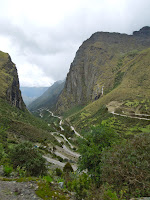 |
| Scenic view on the way up |
Sarah and I did the rain dance
thanking the Inca gods for not having rain at this point in our trip.
Then, we spider legged back into the small
collectivo and headed up the mountain to
Abra Malaga which sits at 4,350 meters or
14,272 feet.
Here we unloaded and got
ready for our bike ride down the massive mountain.
We couldn’t help but think during the ride up,
gazing out the window, how the first Quechua people traveled these
mountains and what the Spanish were thinking when they invaded these lands.
We took one
switchback after
another all the way up.
The higher we
got, the better the view of the awesome scenery that we saw on the way up.
It finally started sprinkling rain when we
got to the cloud line, which we expected.
We unloaded and layered up, because it was cold
at the top and left our bags in the collectivo that was following us to our next
stop.
Some of us had full cage helmets that I
have never worn before in my life, but somehow felt as comfy as a football
helmet to me.
After a safety brief
about how to not die on a bike in Peru, we took a moment to appreciate the
mountain view. We filed in line with our tires turned downhill towards the small town of Santa Maria, our next stop.
 |
| Unloading the collectivo |
 |
| Ready to head down the mountain |
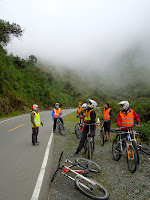 |
| A stop in the cloud forest |
Winding in and out of the clouds we could feel the warm pockets of air
going down into the jungle.
We winded
our way down through the cloud forest one sharp turn after another getting
closer to the valley floor.
Awesome
views were around every corner showing the true beauty of Peru.
We finally got down low enough for our guide
to warn us about five or six waterfalls that poured over the road we'd be riding through.
The first
waterfall was the deepest and fastest flowing of all the others.
Sarah and I both swore if it was running any
harder, it could have swept us off our bikes and off the edge of the road.
The other waterfalls were fun to go through
at high speed and left us soaked, but we didn’t mind.
We made our decent until finally reaching the valley floor.
Santa Maria wasn't too far down the road, so we stopped riding and packed back into the collectivo. Santa Maria
sits at 1,250 meters or 4,101 feet.
For all of
you who are curious but unwilling to do the math, no worries, I got you covered.
We traveled a vertical decent of 3,100 meters or
10,171 feet in a matter of two and a half hours.
This was obvious to us because
we had stripped off all the layers of clothes that we would no longer need during the rest of our trip; we were now in the jungle.
 |
| Panorama of the valley and the road headed down to Santa Maria |
 |
| Sarah hiking through Santa Maria |

We rode twenty-five minutes down
the bumpy road to the small town of Santa Maria.
The whole town was under construction and
luxuries included running water (cold) and a toilet to sit on.
We walked into our hostel and were appointed
our dorm style living quarters with two shared bathrooms with showers in the middle outdoor common area.
I was
the minority male in my room with Sarah and the six German girls.
That night consisted of an exploration of
the small town, a great meal from the local restaurant, and quick meeting with
Yawar about the next day.
Afterwards, we all headed towards bed.
We knew we had
an early morning wake up the next day because we were told in our meeting about the eight hours
of hiking we had to do to make it to our next stop in Santa Teresa.
None of us wanted any part of staying up late.
So after brushing my teeth and seeing the
biggest spider in my life, which I was told is a common smaller tarantula, we
quickly feel asleep.
 |
| Local restaurant in Santa Maria |
 |
| Old Peruvian town |
Dia Dos:
The second
day we all woke up mentally prepared for our eight hours of hiking.
The whole group knew that the
eight hours would be well worth it when we arrive to Santa Teresa with the hot
springs that awaited us.
We grabbed an
early morning breakfast, threw on our packs and headed down the dirt road to
our trailhead.
On the way we noticed the
abundance of mango and banana trees surrounding us.
We passed through an old rundown town that
looked like an old Hispanic western movie set and followed the Urubamba River up to the trailhead at the base of a
mountain.
The
Urubamba River was no
ordinary river, but the most powerful river I had ever been close too or
seen.
With muddy water and sounding like a greyhound bus at full throttle, it was obviously the rainy season.
 |
| Mango trees everywhere |
 |
| Banana tree |
 |
| Headed to trailhead |

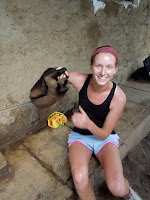
 |
| Hiking up |
Anyway, we all knew this point our mission
was going up and over to the other side of the mountain on a
trail that went straight up.
This was
all right with us since Yawar told us that we had a couple stops at some houses
on the way that had monkeys.
He
referred to it as the 'monkey house'.
We
made it up to the first monkey house where we met a nice old Quechua woman who
had snacks and drinks to sell, but most of all, a small monkey that was tied to
a door.
He was tied up for good reason
too, because he was jumping around trying to grab and bite anything in sight;
small monkey bites though, nothing blood
drawing.
We took a rest and got a chance
to play with the monkey before we hit the trail upward again.
The further we got up the more we realized
how much altitude we were gaining.
With
the small riverbed below us at this point, we made it to the second monkey
house.
We met another nice Quechua woman who had all
the same things to offer us travelers, except she had passions fruit
juice -
real passion fruit, and it was
cold.
Sarah and I gulped down two
glasses of that sweet heavenly nectar.
We got a small cultural briefing about coffee, coca, fruit, and
vegetable productions in the jungle.
We
also got a little insight about the
annatto plant and how the native Quechua
people used the red blood seeds to paint their faces for rituals.
We learned about how the Quechua people
respected and prayed to the gods for the governing of their lives which mostly
included the cultivation and weathering of their lands.
Thanking
Pachamama or Mother Earth comes with the rituals or even small sacrifices such as pouring out a small amount of
the water before drinking to replenish your body.
Respect for the powerful environment we were
in was abundant in the way the native people were still living.
We met the monkey at this stop, which was
tied to a tree but was much less interactive.
Apparently a German girl accidently stepped on his tail while taking a
picture and the monkey has never recovered since.
After a good rest and an awesome overlooking
view of the valley below we packed up to continue our accent up and over the
mountain.
 |
| View of Urubamba river from the top |
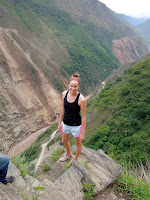 |
| Cliffhanger |
Finally we made it to the top but the challenging part of the hike was not over.
Since Inca people are very small, this
constructed trail that traversed and descended down the mountain was very
steep, very narrow, and had very skinny steps.
We had to be in full concentration for the first part of our decent
because there was around a 1,500-foot drop off to the left of us all the way to
the Urubamba River in the valley floor.
We
eventually scurried down the mountain in a quick decent to a small tin covered
restaurant along the river.
This
restaurant was literally in the middle of nowhere, but we were glad to have
some hot soup and to be out of the rain that was heavy and steady at this
point.
Lunch finished quickly and I
took the chance to grab one of the covered hammocks just a few steps from the
restaurant.
Like I said it was raining
pretty hard at this point so, with the sound of the rain on the tin roof and the
swaying hammock, it took little time to persuade me into a light sleep.
The occasional drip of cold water through the
tin roof on my bareskin didn’t bother me one bit since I was in prime post-lunch real estate.
 |
| Traversing across the mountain |
 |
| Carefully climbing down |
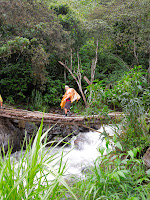 |
| Inka sturdy bridge |
 |
| On the Indian Jones bridge |
After lunch, Yawar told us we would be walking along the river and our travels up and over
mountains would be over…. for today. The rain had become steady as we trekked
along the river passing over waterfalls on “Inca sturdy “ bridges.
Some bridges were made of sticks while some more professionally built.
Needless to say, we definitely followed directions
when instructed to go one at a time over some of them.
We eventually came to a bridge that
passed over the Urubamba River that looked like it was constructed for
an Indiana Jones movie.
Excited and
nervous, we made our way across the swaying bridge trying not to notice the old
rusty cables or the roaring water below.
After successfully crossing over,
we followed the river for another hour or so knowing we had to be close to our destination.
We had to cross the river one final time
to reach the last stretch of our trek to the hot springs in Santa Teresa.
Only our method for crossing the river this time
was by cable car.
Sounds pretty benign
at first, but we soon realized it was a small metal basket pushed and pulled across the river on a cable.
I
don’t know what I envisioned when I first heard 'cable car' but when I saw what
it was, it seemed right at home with the South American experience.
In fact, if it was a fancy motorized gondola,
I probably would have been disappointed.
We anxiously waited our turn and
then it was time for Sarah, our new Dutch friend Arthur, and I to squeeze into
the basket to be sent across the river.
We were given a solid push and glided to the middle of the cable, where, for
a second, we waited over the turbulent river.
After being suspended for a second or two we
were pulled over to the other side.
Before
we knew it we had survived the cable car across the river.
 |
| Cable car crossing |
Our group made it across three at a time and we got ready for our last little
stretch to the hot springs.
We had to go
up the side of the mountain a little bit to avoid the river but on our way back
down, the trail took us right over the hot springs.
Tucked into the base of the mountain next to the Urubamba River, t
hey were the most beautiful hot springs I had ever seen.
With eight hours of hiking finished, our legs and feet aching, we couldn’t
get off the trail and into our suits fast enough.
A lot of words come to mind in trying to
describe how those hot springs felt, but only one word could add the sense of
relaxation and beauty of the atmosphere: the place was simply divine.
The
huge green mountains surrounded by low fast moving clouds, powerful river
nearby, and warm natural water were enough to make Sarah and I not want to
leave.
In fact, we were the last people
in our group to pack up and pile into the collectivo to leave to our hostel.
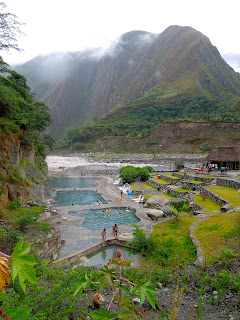 |
| Hot springs in Santa Teresa |
We had
officially finished our longest day of the four-day trek. Everyone was hungry and tried. We had wanted to try to hang out, have a
beer or two, and see what nightlife there was at the discoteca in this small
town, but the hostel beds were calling us. We all scarfed down our dinner and set sights
on our beds. Sarah and I had to mentally
prepare for the adventure we had in store for us - zip lining across the valley with the
Urubamba River, hundreds of feet below us.
With dreams of rolling the dice on South American cables and our bodies
tired from our day of hiking, sleep found us early and quickly. Just like that, half of our four-day
adventure was over and we had yet to even come close to the main event. Machu Picchu was still at hand.
 |
| Our group on an overlook going down to Santa Teresa |








 We rode twenty-five minutes down
the bumpy road to the small town of Santa Maria. The whole town was under construction and
luxuries included running water (cold) and a toilet to sit on. We walked into our hostel and were appointed
our dorm style living quarters with two shared bathrooms with showers in the middle outdoor common area. I was
the minority male in my room with Sarah and the six German girls. That night consisted of an exploration of
the small town, a great meal from the local restaurant, and quick meeting with
Yawar about the next day. Afterwards, we all headed towards bed. We knew we had
an early morning wake up the next day because we were told in our meeting about the eight hours
of hiking we had to do to make it to our next stop in Santa Teresa.
None of us wanted any part of staying up late. So after brushing my teeth and seeing the
biggest spider in my life, which I was told is a common smaller tarantula, we
quickly feel asleep.
We rode twenty-five minutes down
the bumpy road to the small town of Santa Maria. The whole town was under construction and
luxuries included running water (cold) and a toilet to sit on. We walked into our hostel and were appointed
our dorm style living quarters with two shared bathrooms with showers in the middle outdoor common area. I was
the minority male in my room with Sarah and the six German girls. That night consisted of an exploration of
the small town, a great meal from the local restaurant, and quick meeting with
Yawar about the next day. Afterwards, we all headed towards bed. We knew we had
an early morning wake up the next day because we were told in our meeting about the eight hours
of hiking we had to do to make it to our next stop in Santa Teresa.
None of us wanted any part of staying up late. So after brushing my teeth and seeing the
biggest spider in my life, which I was told is a common smaller tarantula, we
quickly feel asleep. 









































